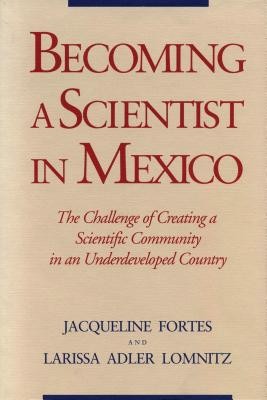
- We will send in 10–14 business days.
- Author: Jacqueline Fortes
- Publisher: Penn State University Press
- ISBN-10: 0271026324
- ISBN-13: 9780271026329
- Format: 16.1 x 23 x 1.7 cm, softcover
- Language: English
- SAVE -10% with code: EXTRA
Reviews
Description
Mexico is a developing society that only recently has begun to fully appreciate the importance of technology to economic success. It has had no clear vision of what the role of science is of how a scientific community can be formed. Understandably, in these circumstances, careers in science still do not have the status and recognition that such professions as medicine, engineering, and law have traditionally enjoyed.
A program to train students in biomedical research was launches at the National Autonomous University of Mexico (UNAM) in the early 1980s as an experiment in providing the conditions necessary for fostering the growth of a scientific community in Mexico, where teaching and research have hitherto been institutionally separated. The authors, drawing on the methods and insights of anthropology, psychology, and sociology, observed the process through which the first two cohorts of students went in their training to become research scientists, in interaction with both their professors and their peers.
What this study shows is that, while the learning of specialized knowledge and techniques are necessary for becoming a scientist, they are not sufficient: the role of beliefs and values is crucial. The authors therefore focus attention on the ethos of science, the ideal model underlying the process of socialization--how it was transmitted to the students and how they assimilated it.
Their findings will be of interest to all scholars studying the relationships of science, technology, and society, especially those concerned about the special challenges underdeveloped countries face in integrating themselves into the worldwide scientific community.
EXTRA 10 % discount with code: EXTRA
The promotion ends in 16d.11:56:39
The discount code is valid when purchasing from 10 €. Discounts do not stack.
- Author: Jacqueline Fortes
- Publisher: Penn State University Press
- ISBN-10: 0271026324
- ISBN-13: 9780271026329
- Format: 16.1 x 23 x 1.7 cm, softcover
- Language: English English
Mexico is a developing society that only recently has begun to fully appreciate the importance of technology to economic success. It has had no clear vision of what the role of science is of how a scientific community can be formed. Understandably, in these circumstances, careers in science still do not have the status and recognition that such professions as medicine, engineering, and law have traditionally enjoyed.
A program to train students in biomedical research was launches at the National Autonomous University of Mexico (UNAM) in the early 1980s as an experiment in providing the conditions necessary for fostering the growth of a scientific community in Mexico, where teaching and research have hitherto been institutionally separated. The authors, drawing on the methods and insights of anthropology, psychology, and sociology, observed the process through which the first two cohorts of students went in their training to become research scientists, in interaction with both their professors and their peers.
What this study shows is that, while the learning of specialized knowledge and techniques are necessary for becoming a scientist, they are not sufficient: the role of beliefs and values is crucial. The authors therefore focus attention on the ethos of science, the ideal model underlying the process of socialization--how it was transmitted to the students and how they assimilated it.
Their findings will be of interest to all scholars studying the relationships of science, technology, and society, especially those concerned about the special challenges underdeveloped countries face in integrating themselves into the worldwide scientific community.


Reviews